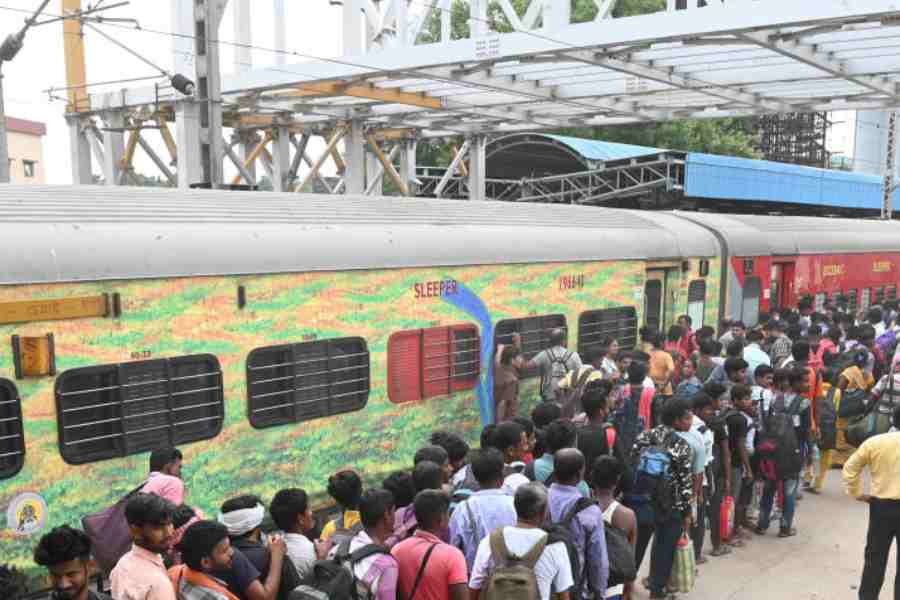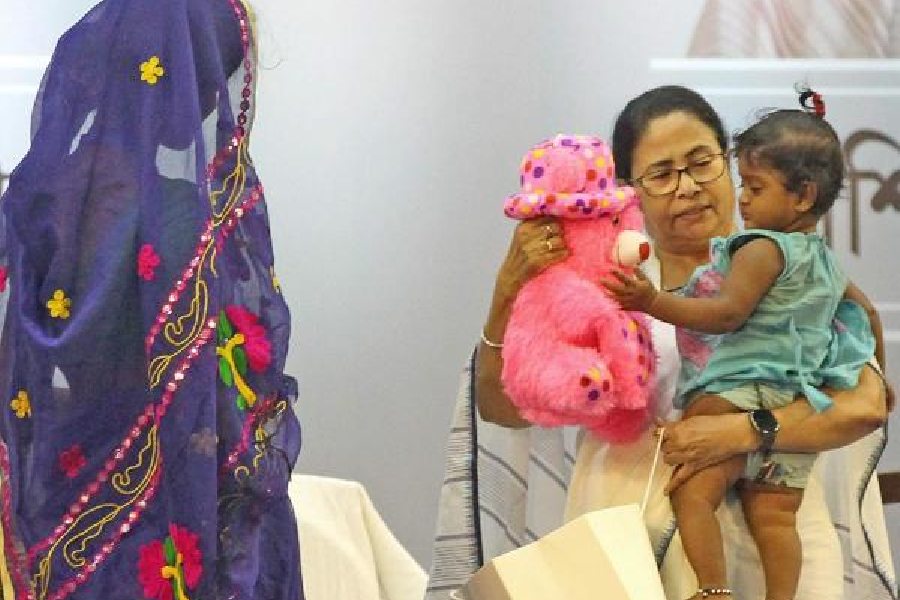The yearning for livelihood overshadows by far the overhang of disaster.
By 2.20pm, hundreds of bags formed a queue on Platform 2. The Up Coromandel Express was yet to arrive at the designated platform.
By 2.45, still 35 minutes before the scheduled departure, humans replaced the bags.
The Coromandel was about to chug out of Shalimar for the first time since Friday night, when at least 288 of the train’s passengers were killed in Balasore in Odisha.
Most of those waitingin the queues were men from the districts of Bengal, headed south to work as masons,construction labourers, painters, tailors, or cooks because opportunities at home are scarce.
“Peter daay boro daay (Feeding mouths is a big responsibility),” said Md Shimar Ali, who works as a construction worker in Ernakulam, Kerala.
The 48-year-old, who hails from Domkal in Murshidabad, will get down at Chennai, the last stop, before boarding another train to Kerala.
“The last train met with an accident. But even if it were bombed, not going back was never an option for me,” said Ali, who coats the walls and ceilings of upcoming buildings with plaster of Paris.
The train rolled into the platform around 2.50pm. As the doors opened, there was a mad rush to get in, prompting railway police to step in and manage the crowd.
While Ali was travelling alone, Tarikul Mondal, from a village in Basirhat, North 24-Parganas, led a group of six.
Mondal peels and cleans prawns for a fish exporter at Nellore in Andhra Pradesh. He will get off at Vijayawada and take another train.
“I have been doing this job for three years. I earn around Rs 20,000 a month,” said Mondal. Before moving south, Mondal did odd jobs as a farm labourer, earning around Rs 8,000 a month.
“Whatever is written in my destiny will happen. But I cannot sit at home scared,” he said when asked whether he felt nervous to get on the train after the accident.
Mondal was accompanied by his sister, her daughter, son-in-law and the couple's two little daughters. Mondal's employer was looking for more men and the son-in-law, Mahruf Sardar, was a possible candidate.
The open platform felt like a cauldron under an unsparing sun. The US-based forecasting agency, AccuWeather, showed a temperature of 35 degrees Celsius around 3.10pm. The RealFeel, a measure of the effect of parameters like temperature, relative humidity and wind, was at 43 degrees.
But five minutes spent inside an unreserved compartment made the scorching platform seem more comfortable. Six persons sat on a seat meant for four. The upper berths were no better. All that a couple of fans mounted on the ceiling did was spit out hot air.
"I take this train once every six months, to come home and then again go back to work. Over the years, you get used to these cramped conditions," said Sanjay Barman, 39, who cooks at an eatery on the outskirts of Chennai.
Dripping sweat and occasionally using a gamchha to wipe his face, Barman, from Shyamnagar in North 24-Parganas, has been working in Chennai for more than five years, the first two of which were spent washing dishes and helping cooks.
Several passengers in the general compartments were from neighbouring Bihar and Jharkhand.
A group of seven came from a village in Madhubani district of Bihar. They were headed to Coimbatore via Chennai where they work as cooks in eateries.
Senior citizens visiting their children and people travelling for medical reasons made up a sizeable section of the passengers in the air-conditioned compartments.
Kahkashan Ahmed, who lives in Park Circus, was travelling to Chennai to be with her sister, who was due for uterus surgery.
"We are nervous (after the accident). But this is a crisis and she needs to be by her sister," said her husband Anzar Ahmed who had come to see his wife off.
The guards at both ends of the train started waving the green flag around 3.35pm, five minutes after the scheduled time. Within seconds, the train started moving.
Several passengers inside the train and cops on the platform captured the moment on their cellphones.












